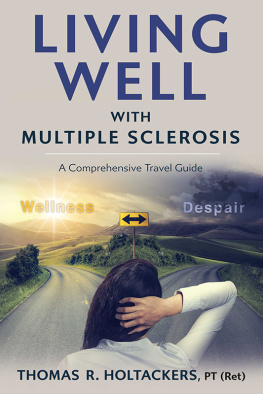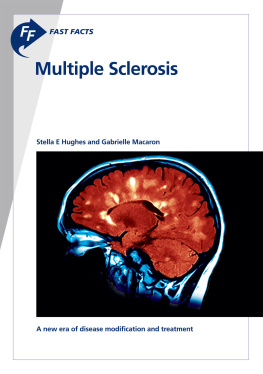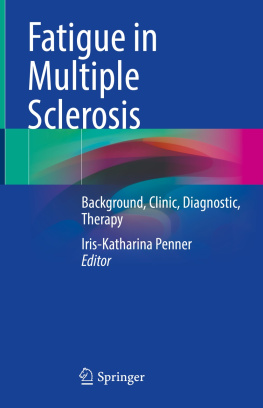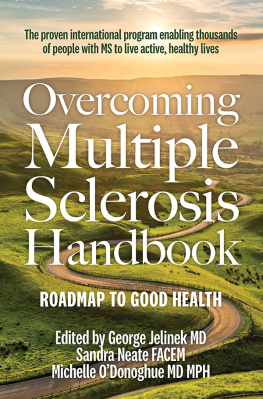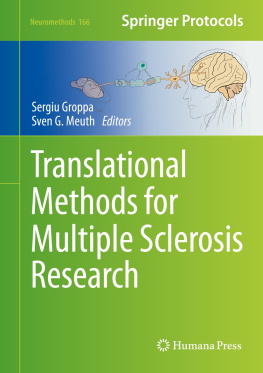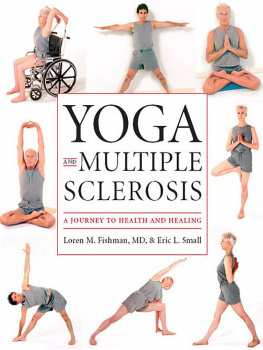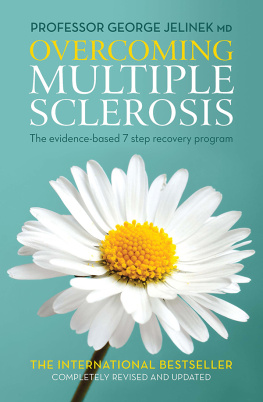2019 Thomas R. Holtackers. All rights reserved. No part of this publication may be reproduced, distributed, or transmitted in any form or by any means, including photocopying, recording, or other electronic or mechanical methods, without the prior written permission of the author, except in the case of brief quotations embodied in critical reviews and certain other noncommercial uses
permitted by copyright law.
ISBN: 978-1-54398-236-7 (print)
ISBN: 978-1-54398-237-4 (ebook)
Contents
Prologue

Living with multiple sclerosis (MS) is a lifelong journey that requires you, the traveler, to make many adjustments to accommodate the rigors of lifes winding road, filled with detours and potholes, while riding in a vehicle that is prone to breakdowns. The effects of life in general combined with living with a chronic, progressive disease upon this carriage you call your body are difficult and incomplete, for they not only affect the physical mechanical aspects of movement and power, but also the emotional quality of the ride. However, there is a way to endure these life changes, by following the living well with MS concepts. These concepts combine three essential partsemotional health, cognitive well-being, and physical fitnesseach acting as independent yet interactive components of the whole.
The path down which you travel in life in general may be plagued by hills and valleys, twists and turns; however, living with multiple sclerosis requires navigating the impediments of any number of possible symptoms, which makes your lifes journey especially treacherous. Living Well with Multiple Sclerosis: A Comprehensive Travel Guide is a handbook for voyagers with MS who seek to better their lives through healthy living. It is not for sightseeing tourists, because adjusting to the harshness of multiple sclerosis is not a vacation.
This travel guide helps you make choices. You can choose to sit in a recliner or get up and move the best way possible. You can eat a candy bar or eat an apple; you can ignore the progression of the disease or take an active part in managing its symptoms. You can sit and cheer on others working for a cure, or you can get out of the bleachers and onto the playing field by volunteering and fundraising. These choices are up to all those who have the disease. What about you?
The concepts, principles, ideals, notions, techniques, and goals found in this travel guide can help you find options and make choices regarding wellness, health, and fitness, such as:
- becoming stronger, having more flexibility, and having more endurance, to maintain the best possible level of functional independence
- managing symptoms more effectively
- preparing for the recovery from a flare up of multiple sclerosis
- preparing for the ultimate victory: the cure and reversal of MS.
A one-size-fits-all approach to living well with MS would be as ambiguous as the disease. Therefore, throughout the text, terms like could, may, possible, some, approximately, might, many, and other nonspecific words are used to describe how wellness may play a role in managing your multiple sclerosis.
The concepts discussed in the following chapters are not intended to diagnose, prescribe, or treat the physical, mental, or emotional aspects of multiple sclerosis. Nor does the guide attempt to explain all the symptoms of MS that may affect you specifically. A qualified health care provider should be consulted before engaging in any exercise regimen, diet, over-the-counter medication, herbal supplement, fitness program, psychological counseling, treatment program, or any other implication of such expressed in the text of this book.
As you follow this travel guide toward fitness, you will realize that an explorer found the way ahead for you through the wilderness, plotted a course for others to follow, and retraced that path throughout life with the intention of expanding everyones horizons. The author is that explorer.
About The Author

Thomas R. Holtackers received his bachelor of arts in health, physical education, and recreation from Montclair State University in Upper Montclair, New Jersey, and a degree in physical therapy from the Mayo Clinic Physical Therapy Program in Rochester, Minnesota. He completed the coursework for professional development in the Counselor Education Program at Winona State College, Winona, Minnesota, and was a staff physical therapist at Rochester Mayo Clinic for over forty-two years. His work during those years included treating critically ill patients in intensive care units, patients with multiple sclerosis in the inpatient rehabilitation unit, and patients with upper extremity problems in the hand therapy department. He was the patient education specialist for the physical medicine and rehabilitation department in the section of patient education. He was a clinical and classroom instructor at the Mayo School of Health Sciences Physical Therapy Program . Tom is a former college athlete and high school health/physical education teacher and football coach. He has had multiple sclerosis for over forty-five years.
Tom was an active fundraiser for the Upper Midwest chapter of the National MS Society, having participated in local MS walks for over twenty-five years, and is a nine-year sole survivor of the 50 Mile Challenge Walk, which he completed in a hand-cycle.
He has been a volunteer with the National MS Society for over forty years, serving in various capacities at the national and chapter levels. His involvement includes teaching water and land exercise classes, facilitating self-help groups, training self-help group leaders, serving on chapter programs and medical advisory committees, and being a member of the Upper Midwest chapters board of trustees. He has given many talks throughout the Upper Midwest states on physical fitness, sexuality, and management of MS symptoms including fatigue, spasticity, muscle weakness, and bladder dysfunction. He was a member of the National MS Societys National Programs Advisory Council, the Assisted Living Task Force, the Strategic Response Goal Steering and Implementation Teams, and the Midwest Regional Volunteer Leadership Council.
The author was also active in the American Physical Therapy Association on the state and national levels, the Mayo Clinic Physical Therapy Program Alumni Association, and the Rochester Center for Independent Living, and was a member of the Minnesota Governors Council on Disability.
In addition to many MS Society local chapter awards, such as the Norman Cohen Hope Award, Tom was inducted into National Multiple Sclerosis Societys Volunteer Hall of Fame in 1999, was highly honored as the recipient of the National Multiple Sclerosis Societys 2010 National Volunteer of the Year, and was awarded a Lifetime Achievement Award for over thirty-five years of volunteering.
Tom was the recipient of the Corrine Ellingham Outstanding Physical Therapist Award from the Minnesota American Physical Therapy Association, and the Dale Schaffer Outstanding Alumnus Award from the Mayo Clinic Physical Therapy Program Alumni Association.
Tom presently resides in Mesa, Arizona, with his wife, Anne, and volunteers for the Arizona chapter of the National MS Society. He can be contacted at: mssux@mac.com.

